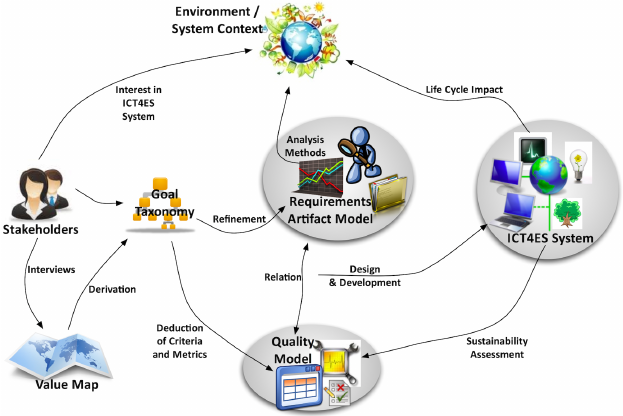This paper [1] primarily aims to shift the focus of software systems from immediate short term monetary goals to the long term cumulative impacts that the system has on the society, the environment at large and its immediate audience while also considering the conventional economic dimensions of a software product. It clearly distinguishes the conventional monetary benefit based system with the notions of sustainable software engineering that breaks down a software product into its five constituent dimensions which are individual, social, economic, technical and environmental. The authors call for a greater co-operation between the academia and the industry to further enhance research on sustainable ventures in the tech industry and to also provide the necessary resources through educational curriculums to budding engineers. This paper clearly identifies requirements engineering as the pivotal phase wherein sustainability tactics or measures must be employed to achieve the larger goals of a software system as clearly exemplified in the two contrasting approaches to software engineering.
The reason I alluded to ‘renaissance’ in the title of this essay is that this truly is a paradigm shift in software methodology and the times are ripe for a reawakening in how we perceive software systems as they become more symbiotic to the human experience. Also the notion of sustainability debt struck me as a critical factor to be considered in engineering practices, since any decision that the product team makes has a far reaching impact in all the other dimensions along with their stakeholders. If it were to be considered a critical factor in today’s tech industry, then many of the current industrial era manufacturing strategies like pumping and dumping of products in the market would stop and there would be more impetus on quality products that are upgradable and less wasteful.
The assertion in this paper is that a sustainable point of view can provide a product with a unique selling point which companies can leverage to gain market share. But most successful ventures historically have leveraged the consumeristic tendencies of the society rather than cater to the idealistic notions of what a product should be. The ventures themselves are a reflection of the society and unless there is a path breaking shift in government policies backed by public support to incentivize sustainable ventures, the capitalistic mindset shall prevail. Under these prevailing circumstances few organizations would be willing to cannibalize their growth for the greater good. This I believe is one of the biggest challenges that sustainable ventures in general face.
As we move towards an era of greater awareness of resource utilization and increased machine dependence, sustainable notions in software engineering would truly be tested like most definitive ideologies that have withstood the tests of time in their respective renaissance eras.
References: [1] Becker, C., Betz, S., Chitchyan, R., Duboc, L., Easterbrook, S. M., Penzenstadler, B., Venters, C. C. (2016). Requirements: The Key to Sustainability. IEEE Software,33(1), 56-65. doi:10.1109/ms.2015.158
